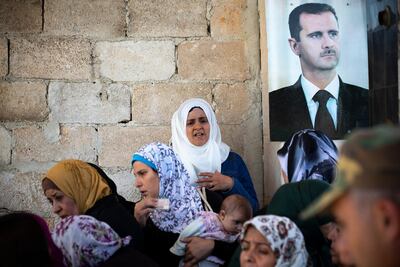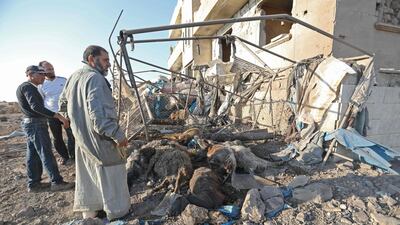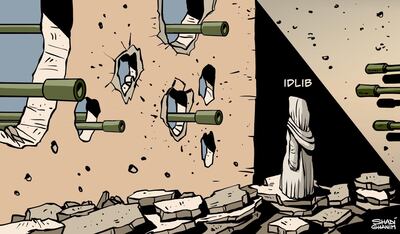It is unfair to judge a conflict by its death toll but in some cases it helps shed light on the scale of its destruction. Figures on the Bosnian War between 1992 and 1995 are disputed but around 250,000 are said to have perished. The Rwandan genocide in 1994 left one million dead over the course of three terrible months. And the Second Congo War between 1998 and 2003 caused more than five million fatalities through disease and starvation. Figures do not necessarily make one conflict worse than the other as they only tell us a part of the story, nonetheless they should compel reflection.
This brings us to the Syrian Civil War, which is now into its eighth year. And while the United Nations officially stopped counting in 2016, the number of people who have lost their lives is estimated to be nearly half a million. The humanitarian crisis as a fallout of it is said to be the worst this century has witnessed, with more than five million people fleeing the country and putting an enormous amount of strain on resources and infrastructure in neighbouring countries such as Jordan, Lebanon and Turkey.
The war may be drawing to a close, with only Idlib province – near the Turkish border in Syria's north-west – holding out against the government forces of Bashar Al Assad. As a result, it has largely faded from international headlines. Unfortunately, the regime continues to brutalise those living in the last rebel stronghold. It has killed 1,089 civilians in the past four months alone, left hundreds of thousands of women, men, and children internally displaced and driven three million civilians to the so-called de-escalation area where they find themselves trapped.
What is worse, schools and hospitals have become military targets as the regime refuses to spare even the young and the wounded. Last year, it bombed health and education centres that the UN said were to be protected under international law. According to Mark Lowcock, the head of the UN's Office for the Coordination of Humanitarian Affairs, both the government and rebel forces were ignoring their pleas to stop the bombing. "There is no refuge for the people of Idlib," Mr Lowcock said. "Hundreds of them have been killed, hundreds more injured, 440,000 of them displaced, but there is nowhere else for them to go." He warned that if the "bloody onslaught in full swing" does not stop, it could create the worst humanitarian crisis the world has seen this century.
______________
Shadi Ghanim's take on Idlib crisis
______________
But even as Foreign Minister Walid Muallem addressed the UN General Assembly last week, thereby bringing some attention to the war, world leaders were largely focused on other issues such as climate change and Iran's foreign policy adventures in the Middle East. And with Russia, Turkey and the Iranian regime – all external players in the war – having taken the lead in the negotiation process between the regime and the rebels, Syria has garnered much less interest among the rest of the international community.
Of course, this is not to say that nothing is being done to help put Syria back together. Last week, the UN revisited its own peace process, long considered dead in the water after it was formalised through a Security Council resolution in 2015. The resolution was considered a joke as its calls for a ceasefire and political settlement in Syria were ignored by the parties involved. In fact, a year after it was passed, the city of Aleppo fell to the regime in a brutal operation that lasted for months. But with the regime and its allies having gained the upper hand in this war, there is now a much greater resolve to end it but with conditions attached. A constitutional committee has been formed comprising members of the regime and some opposition figures who are in exile. There is also talk of holding elections in 2021, the legitimacy of which will no doubt raise questions given the regime’s hold over the country.
However, plenty of questions remain unanswered, including who will foot the bill for Syria's reconstruction – an issue over which there has been much haggling between the external parties. There is also the crucial issue of bringing refugees home. While few will ever refuse to return, there will always be doubts regarding their safety and security so long as the Assad regime stays in control of the country. Given that there is little chance of Mr Al Assad vacating power, the announcement of the constitutional committee will do little to assuage the concerns of those who either rebelled against his government or escaped its cruelties since the uprising began in 2011.

With these and other questions left to be answered and no easy solutions in sight, and with the world distracted by other events elsewhere – including Brexit and US President Donald Trump's impeachment proceedings – there is every chance Syria's war will drag on unnoticed. Last week, I spoke to Waed Al Kataeb, a young citizen journalist whose film For Sama captures the horrors of the siege in Aleppo. "Has Al Assad won?" I asked her, to which she replied: "No one won. People think the war is over but it's not."
It is therefore important for the international community to understand that there is a moral imperative to end this war justly, which goes beyond strategic calculations on the part of the external parties involved. The rest of the world needs to stand up to the brutalities taking place in Syria and act now to save and rehabilitate as many lives as possible while not hesitating to punish the perpetrators of the many war crimes committed over almost a decade. Because, if the world's most influential powers do not act to end it, what message will this send to other countries that could face such conflicts in the future?
Janine di Giovanni is a senior fellow at Yale’s Jackson Institute for Global Affairs and a 2019 Guggenheim fellow



